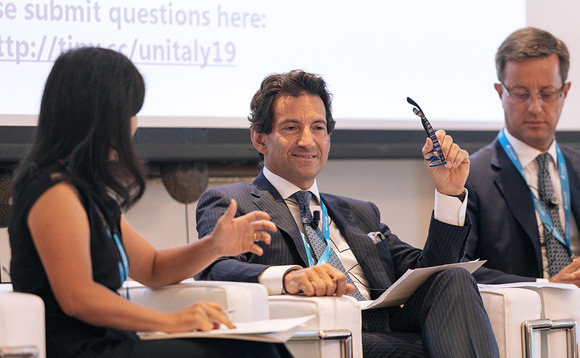
Italy: exit routes open up as foreign capital pours in

Exit routes for Italian-owned companies and opportunities for foreign investors were key themes discussed at Unquote's Milan forum in early July. A panel of experts chaired by Denise Ko Genovese shared their insights on the topic
Marco Perelli-Rocco, the head of M&A at Banca IMI, set the tone at the Italian Private Equity Forum in Milan by saying that investment is on the rise in Italy, with more than €16bn poured into the country through private equity deals in 2018, a 35% increase on the €11.8bn recorded in 2017 and 2016's €12.4bn. Two thirds of this value came from foreign sponsors, with their average ticket size coming in at the €100m mark; this is four times larger than the deals inked by Italian houses, with an average ticket of €26m in 2018. Notable deals in 2018 included KKR-owned Calsonic's acquisition of Magneti Marelli and CVC's acquisition of Recordati, as well as Bain's purchase of Italmatch Chemical and BC Partners' acquisition of Forno d'Asolo.
High prices paid by foreign sponsors could be due to the fact that financing is readily available from various sources, with the average international private equity house leveraging deals to 4.0-4.75x, said Perelli-Rocco. He added that sponsors often turned to the high-yield market, as well as providers of unitranche structures. Italian houses, on the other hand, were more conservative in their use of leverage and relied more on traditional club deals.
This appetite for investment from PE houses – and international ones in particular – created a healthy exit pipeline for investors. "The most notable exit route [for an Italian company] in 2018 was a secondary buyout, accounting for roughly 37% of deals in value," said Perelli-Rocco, citing the latest AIFI report.
Size matters
Taking up the theme of why other exit routes have traditionally posed barriers to Italian companies, Fineurop Soditic CEO and founding partner Eugenio Morpurgo said IPOs were typically not a go-to option because of size. "Italy still has a wealth of family-owned businesses and most companies are SMEs, so they wouldn't be large enough to take advantage of the public markets," he argued.
However, Morpurgo did go on to say that the introduction of the SPAC (special purpose acquisition company) structure had helped increase the likelihood of a company going to IPO over the past few years. For example, when the auction process of Guala Closures was unsuccessful, the use of an SPAC facilitated an exit for the incumbent owner and ultimately a listing. The SPAC allows a group of promoters and investors to come together and establish a financial vehicle that can provide additional capital for the company's growth.
With regard to trade sales, Mandarin Capital Partners managing partner Lorenzo Stanca underlined that although this was the second most popular exit route after a secondary buyout, the strategic players were predominantly international. "There are not many local consolidators in the market compared to Germany and France, so typically when a company is sold to a strategic player, it falls into international hands," he said.
Foreign intentions
Stanca continued by saying that foreign equity was typically relatively aggressive, knowing that they can build and scale up. There is also a lot of competition for larger deals because of the amount of dry powder at hand.
"We do have five or six well-run GPs that look at companies with below €11-12m EBITDA, but not the larger deals," Morpurgo added. And conversely, the larger international firms are not so interested in the small-cap or mid-market deals, where there is a huge pipeline in the country.
In recent years, Ardian, Alpha and Capvis have set up strategies targeting the Italian mid-market, though the small-cap segment is still the preserve of domestic funds such as Progressio, Green Arrow and Consilium.
When asked about future prospects, panellists were characteristically optimistic about their region. The market's growing depth was a theme that stood out: Morpurgo noted that there is a wide range of fund types available now, such as permanent capital players and clubs of funds, which can offer more flexibility than in the past.
Latest News
Stonehage Fleming raises USD 130m for largest fund to date, eyes 2024 programme
Sponsor acquired the public software group in July 2017 via the same-year vintage Partners Group Global Value 2017
Stonehage Fleming raises USD 130m for largest fund to date, eyes 2024 programme
Czech Republic-headquartered family office is targeting DACH and CEE region deals
Stonehage Fleming raises USD 130m for largest fund to date, eyes 2024 programme
Ex-Rocket Internet leader Bettina Curtze joins Swiss VC firm as partner and CFO
Stonehage Fleming raises USD 130m for largest fund to date, eyes 2024 programme
Estonia-registered VC could bolster LP base with fresh capital from funds-of-funds or pension funds









